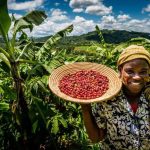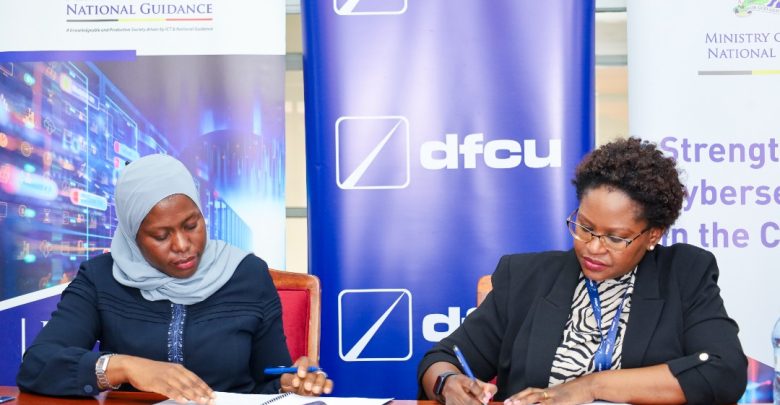
dfcu Foundation and Ministry of ICT & National Guidance Sign Strategic Partnership to Strengthen Digital Skilling and Innovation Across Uganda
The Ministry of ICT & National Guidance and the dfcu Foundation have today signed a strategic partnership aimed at accelerating digital skilling, innovation and enterprise transformation across Uganda. This collaboration brings together government leadership and private sector experience to equip entrepreneurs, youth, SMEs, women-led enterprises and community organizations with the digital tools and skills needed to thrive in today’s technology-driven economy.
Speaking at the signing ceremony, both institutions highlighted the importance of working together to advance Uganda’s digital ambitions. The Ministry—charged with driving the national digital agenda—will leverage its nationwide network of Innovation Hubs as key delivery points for the partnership. These hubs serve as centres for digital training, mentorship, creativity and community engagement. Through this partnership, they will be further strengthened to deliver practical digital skills, enterprise growth support and technology-enabled opportunities.
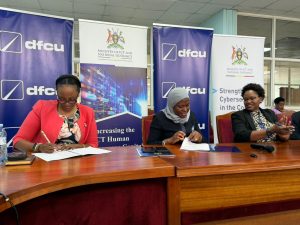
dfcu Group, through the dfcu Foundation and dfcu Bank, will complement this national infrastructure by contributing equipment, expertise and a long-standing commitment to enterprise development. dfcu Bank has pledged computers to the National ICT Innovation Hub, enabling young innovators and emerging digital professionals to access essential tools for learning, innovation and business development.
In addition, the dfcu Foundation, through its Business Acceleration Program, will work with the Ministry to co-create digital and enterprise skilling programmes covering financial literacy, business formalization, governance and leadership. The shared objective is to bridge digital gaps, stimulate enterprise growth and drive inclusive economic participation.
In her remarks, Dr. Amina Zawedde, Permanent Secretary of the Ministry of ICT & National Guidance, underscored the national importance of the initiative. “Our Innovation Hubs were established to nurture Uganda’s digital talent and expand access to ICT services. This partnership with the dfcu Foundation strengthens our ability to deliver on that mandate by expanding equipment, training and real-world enterprise support. When government and the private sector move together, we move the country forward.”
Representing dfcu Foundation, Mabel Ndawula, Executive Director, highlighted the shared purpose behind the partnership. “This collaboration is grounded in mutual respect and complementary strengths. The Ministry provides a strong national platform through its Innovation Hubs, while dfcu brings tools, enterprise support and deep experience working with SMEs, farmers, women and youth. Together, we are shaping a future where every Ugandan can participate meaningfully in the digital economy.”
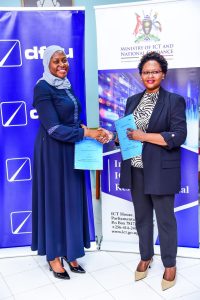
Helena Mayanja, Head of Corporate Affairs & Sustainability at dfcu Bank, noted that the Bank’s contribution aligns with its long-standing role as a partner in Uganda’s progress. “This initiative reaffirms dfcu Bank’s commitment to building a stronger, more prosperous and sustainable Uganda. By equipping the Ministry’s Innovation Hubs with computers, we are helping ensure that digital transformation reaches communities across the country, not only those in urban centres.”
“Technology creates real impact when it enables innovators, entrepreneurs and young people to build resilient businesses and create long-term opportunities for themselves and their communities. Through this partnership, we are proud to support Uganda’s vision for a digitally skilled, inclusive and sustainable economy,” she added.
The partnership will expand digital skilling through the Ministry’s Innovation Hubs, improve access to enterprise development and extend digital literacy to grassroots entrepreneurs. It will also support national efforts to prepare Ugandans for opportunities in e-commerce, digital finance, innovation and ICT-driven business.
As the ceremony concluded, Mabel Ndawula reaffirmed the partners’ shared commitment: “This partnership unites the strengths of government and private sector with one shared goal: to unleash digital transformation and foster sustainable businesses in Uganda.”
Source: dfcu Bank – dfcu Foundation and Ministry of ICT & National Guidance Sign Strategic Partnership to Strengthen Digital Skilling and Innovation Across Uganda – dfcu Bank
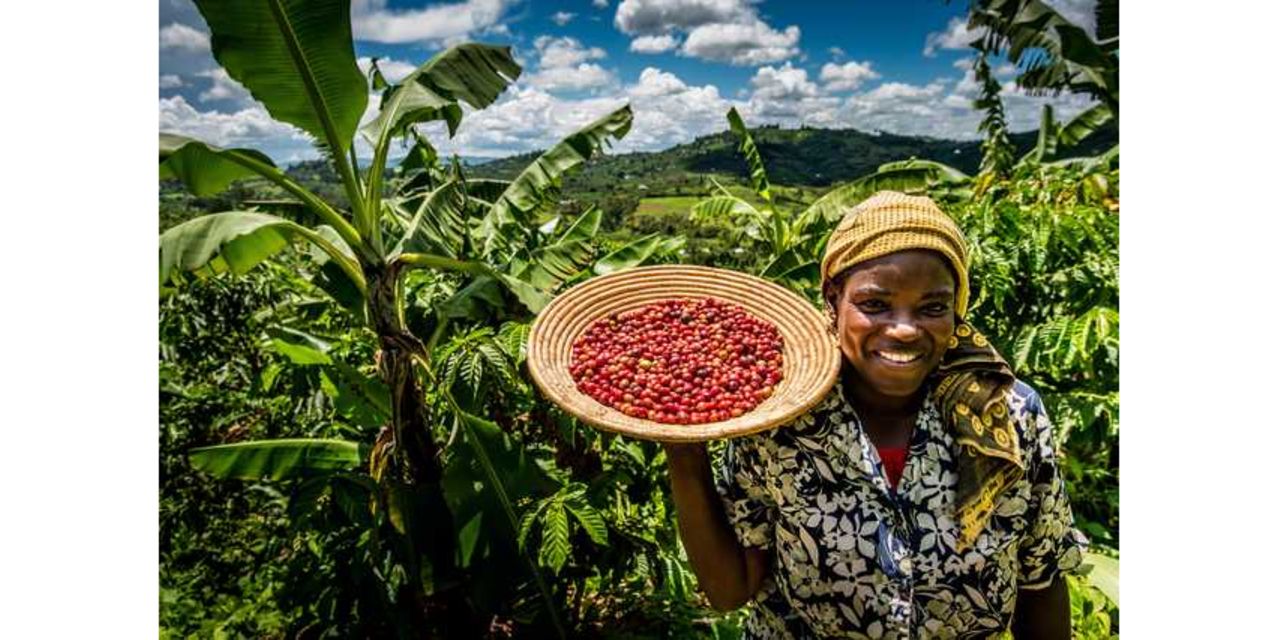
2,280 agribusinesses to benefit from Shs100b programme
With support from the dfcu Foundation, female farmers will not just pick coffee beans but will plant the seeds of their family’s financial future. PHOTO | GEORGE KATONGOLE.
In a bid to unlock economic potential for smallholder farmers and agribusinesses, the dfcu Bank, under dfcu Foundation, has launched the Financial Expansion for Agribusiness Transformation (FEAT) Programme. This initiative, backed by the Rabo Foundation, is set to boost productivity and profitability for smallholder farmers and agribusinesses, with a special focus on women, youth, and vulnerable communities.
Economic impact
The programme’s ambitious goal is to support 2,280 agribusinesses and directly impact more than 100,000 individuals across key value chains, including coffee, dairy, cereals and oil seeds. FEAT also plans to train 80,000 learners, with 50 percent being women and 40 percent youth, a measure expected to reach more than 400,000 Ugandans based on the average household size. The FEAT programme is a direct response to the glaring gaps in Uganda’s agriculture sector. While farming employs more than 70 percent of the working population, and contributes about a quarter of the national GDP, the sector’s output is often limited by a lack of access to financial services, technology and essential skills.
The programme’s focus on women and youth is particularly critical. Despite being a major part of the agricultural workforce, women in Uganda often have less access to land ownership and credit, resulting in their farms being significantly less productive than those managed by men. Similarly, a high youth unemployment rate makes empowering young people with agribusiness skills a vital step toward creating a more vibrant and sustainable economy.
To drive financial sustainability, FEAT will avail Shs100b in financial linkages. A key component of the programme is the introduction of a revolving fund facility designed to support early-stage enterprises that are not yet ready for commercial credit. Alongside this, participants will receive capacity building in leadership, governance, financial literacy and climate-smart agriculture, delivered through management business advisors, AgriTech experts and digital platforms such as the dfcu Foundation’s SOMA e-learning platform.
Inclusive growth
Mabel Ndawula, the Executive Director of dfcu Foundation, emphasizes the programme’s collaborative mission. “At its heart, FEAT is a collaborative effort to unlock real opportunities for farmers and entrepreneurs—through access to finance, markets and skills,” she says. “The combined strength of Rabo Foundation’s global expertise and dfcu’s deep local commitment ensures smallholder farmers and Small and Medium-sized Enterprises (SMEs) can move from subsistence to prosperity, driving inclusive growth and resilient rural economies.” Dfcu Bank Chief Executive Officer Charles Mudiwa adds that the initiative is a natural extension of the bank’s mission.
“Through FEAT, we are not only expanding access to finance but also investing in the skills, technologies and partnerships that make agribusiness more competitive, resilient and inclusive. This programme reflects our long-term commitment to empowering farmers and positioning agriculture as a driver of sustainable national growth,” he says. Echoing the sentiment, Sonja Timmer, the lead Impact Finance, Africa at Rabo Foundation, notes that the FEAT programme builds on a long-standing partnership. “The FEAT programme reflects our shared belief that entrepreneurship in smallholder value chains is key to sustainable growth. FEAT is more than a programme: it aims to be a catalyst for change, equipping agri-entrepreneurs and farmers with training, tools and financial solutions to scale their businesses,” she says.
Source: The CEO – https://www.monitor.co.ug/uganda/magazines/farming/2-280-agribusinesses-to-benefit-from-shs100b-programme-5182308

dfcu Foundation Launches the FEAT Program to Empower Agribusinesses and Drive Inclusive Economic Growth in Uganda
dfcu Foundation has officially launched the Financial Expansion for Agribusiness Transformation (FEAT) Program, a strategic initiative designed to strengthen Uganda’s agribusiness sector. The program targets smallholder farmers (SHFs) and agribusiness enterprises with the goal of improving productivity, profitability, and access to markets and finance—particularly for women, youth, and vulnerable communities.
Backed by dfcu Foundation and Rabo Foundation, FEAT is set to support 2,280 agribusinesses and impact over 100,000 individuals across value chains in coffee, livestock-dairy, cereals, and oilseeds. The program also plans to train 80,000 learners-50% women and 40% youth-reaching over 400,000 Ugandans based on average household size.
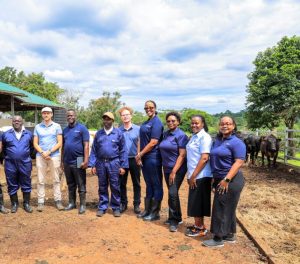
A group photo at Prime Agro Farm in Zirobwe during the launch of Best Farmers 2025.
To drive financial sustainability, FEAT will facilitate UGX 100 billion in financial linkages while introducing a Catalytic (Revolving) Fund Facility to support early-stage enterprises that are not yet ready for commercial credit. Complementing finance, participants will access capacity building in leadership, governance, financial literacy, marketing, price risk management, and climate-smart agriculture through Management Business Advisors, AgriTech experts, and digital platforms such as dfcu Foundation SOMA e-learning platform and the Bean Book tool for coffee exporters.
Mabel Ndawula, Executive Director of dfcu Foundation, said:
“At its heart, FEAT is a collaborative effort to unlock real opportunities for farmers and entrepreneurs through access to finance, markets, and skills. The combined strength of Rabo Foundation’s global expertise and dfcu’s deep local commitment ensures that smallholder farmers and SMEs can move from subsistence to prosperity, driving inclusive growth and resilient rural economies.”
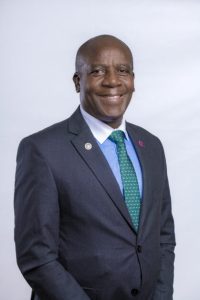
Charles Mudiwa, dfcu Bank Chief Executive Officer.
Charles Mudiwa, CEO of dfcu Bank, added:
“Agriculture remains the backbone of Uganda’s economy, and supporting its transformation is central to dfcu’s purpose of building better lives and businesses. Through FEAT, we are not only expanding access to finance but also investing in the skills, technologies, and partnerships that make agribusiness more competitive, resilient, and inclusive. This program reflects our long-term commitment to empowering Uganda’s farmers and positioning agriculture as a driver of sustainable national growth.”
Sonja Timmer, Lead Impact Finance, Africa at Rabo Foundation, noted:
“The FEAT program builds on our longstanding partnership with dfcu Foundation, whose team brings deep local expertise in Uganda’s agribusiness sector. It reflects our shared belief that entrepreneurship in smallholder value chains is key to sustainable growth. FEAT is more than a program: it aims to be a catalyst for change, equipping agri-entrepreneurs and farmers with training, tools, and financial solutions to scale their businesses sustainably and improve livelihoods.”
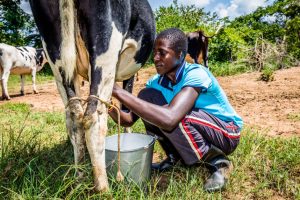
Why FEAT Matters
- Agriculture employs 73% of Uganda’s workforce but continues to face barriers in finance, markets, and business skills.
- FEAT combines capacity building, blended finance, and digital innovation to address these gaps.
- By prioritizing women, youth, and climate-smart practices, FEAT strengthens competitiveness, resilience, and inclusivity in the agribusiness sector.
Source: The CEO – https://www.ceo.co.ug/dfcu-foundation-launches-the-feat-program-to-empower-agribusinesses-and-drive-inclusive-economic-growth-in-uganda/
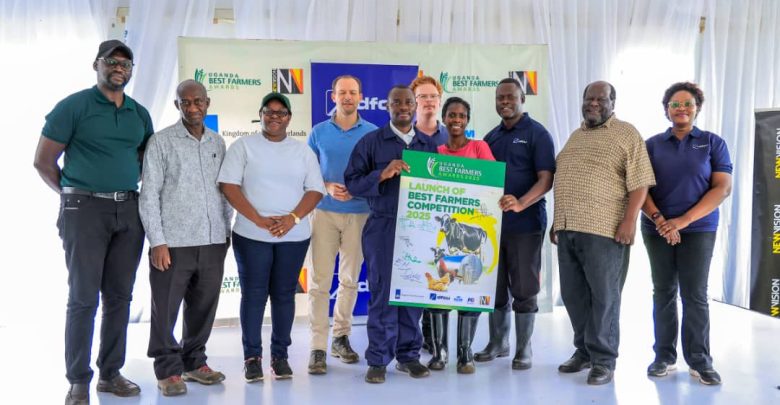
dfcu Bank Targets Agricultural Finance as Sector Faces Persistent Challenges
dfcu Bank has expanded its agricultural operations through a rebranded foundation and dedicated segment, as Uganda’s farming sector continues to grapple with financing gaps and post-harvest losses.
The bank’s Agriculture Segment, alongside the newly rebranded dfcu Foundation, formerly the Agribusiness Development Centre has trained over 27,000 farmers and worked with 885 enterprises across the country. The foundation reports that 54% of supported businesses are women-led, with more than 40,000 Ugandans receiving direct benefits.
“Agriculture is the soul of Uganda’s economic resilience. Our role is to empower farmers, cooperatives, and agribusinesses with the tools, skills, and financing they need to thrive,” said Alex Madolo, Head of Agriculture at dfcu Bank. “We see farmers not just as clients, but as partners in national transformation.”
Despite these interventions, significant obstacles remain in a sector that employs 70% of Uganda’s population. Post-harvest losses continue to reach 40% of produce, while climate shocks and limited access to finance constrain growth for smallholder farmers.
According to the bank’s 2024 Annual Report, dfcu disbursed UGX 11.2 billion specifically for women entrepreneurs in agriculture last year. The foundation has facilitated 2,112 agribusiness jobs and indirectly impacted an additional 100,000 people through market access improvements.
The bank has identified three focus areas: digital agriculture finance through mobile platforms, youth engagement in agribusiness, and expanding women’s access to agricultural financing. These initiatives represent dfcu’s response to persistent challenges in a sector that remains central to Uganda’s economy.
“We are innovating around these challenges designing seasonal loan products, promoting group lending, and partnering with insurers to protect farmers against climate risks,” Madolo explained. “When farmers grow, Uganda grows. No farmer should be left behind.”
The transition from the Agribusiness Development Centre to the dfcu Foundation signals the bank’s continued investment in agricultural development, as the 61-year-old institution seeks to balance commercial banking operations with development objectives in Uganda’s primary economic sector.
Source: The CEO – https://chimpreports.com/dfcu-bank-targets-agricultural-finance-as-sector-faces-persistent-challenges/

A New Chapter: dfcu Foundation to drive inclusive economic empowerment across Uganda.
Mbarara, Uganda | THE INDEPENDENT | dfcu Bank has officially launched the dfcu Foundation in Mbarara district, a rebrand of the Agribusiness Development Centre (ADC) under the theme ‘’A New Name, A Renewed Commitment.’’
The launch reiterates the foundation’s commitment to supporting Uganda’s agricultural sector, an official said. “This strategic transition aims to widen impact, bringing dfcu Bank closer to farmers countrywide and facilitating access to financial resources, increased markets and capacity-building programs.”
Bank officials said that the decision to launch and rebrand from Agribusiness Development Centre (ADC) to dfcu Foundation arises from dfcu Bank’s purpose of ‘’Transforming Lives and Businesses in Uganda’’ and aims to create a more inclusive and structured approach to empowering agribusinesses, SMEs, and farmer groups.
While ADC majorly focused on agricultural value chains, dfcu Foundation will have a large mandate including financial literacy, business mentorship, access to credit and market linkages for farmers countrywide and agribusiness entrepreneurs.
Speaking at the launch, Kate K Kiiza, the executive director at dfcu Bank emphasized the foundation’s role in transforming Uganda’s agriculture sector:
She said, ’”The launch of dfcu Foundation marks a new era of empowerment for Ugandan farmers. Our goal is to ensure that every farmer, agribusiness owner, and rural entrepreneur has the knowledge, resources, and financial tools needed to succeed. We believe that by promoting agricultural growth, we strengthen Uganda’s economy and create long-term benefits and prosperity.”
She added, “While agribusiness remains at our core, the dfcu Foundation will also focus on enterprise development, financial literacy training, and sustainability initiatives. This rebrand strengthens our purpose and amplifies our impact, aligning with dfcu’s long-term strategy for national transformation. Additionally, through integrating financial empowerment, environmental governance, and enterprise development, we are strengthening our commitment to sustainable growth and economic progress’’.
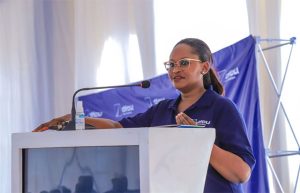
Mabel Ndawula, the Executive Director of the dfcu Foundation speaks after a tour of a model farm with stakeholders that included farmers and bank customers.
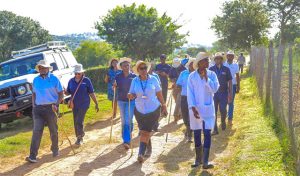
Mabel Ndawula, the Executive Director of the dfcu Foundation, said, ‘’We are excited to launch dfcu Foundation; a strategic move designed to deepen our relationship with farmers and expand our impact. This transition is not a departure from our commitment to agribusiness but rather an opportunity to increase our reach and add to our contribution to national development.”
She added, ‘’At dfcu Foundation, our goal is to double the impact of past initiatives. Under the Agribusiness Development Centre, we already reached 59,000 beneficiaries, and over the next five years, we aim to impact 100,000 more. Of these, 60% will be women and 40% will be youth, with the focus given to Uganda’s youthful population, where approximately 77-78% are young people with high unemployment rates and limited job market absorption. dfcu sees farming and small business development as viable solutions for economic empowerment and job creation’’.
Agriculture remains Uganda’s largest employer, accounting for over 70% of the population and contributing 24% to the national GDP. The sector is a key driver of rural livelihoods, food security and national economic development. However, challenges such as limited access to credit, market volatility, and inadequate business skills continue to hinder farmers’ productivity and growth. The dfcu Foundation seeks to close these gaps through the provision of tailor-made solutions to accelerate agricultural growth and financial inclusion.
Through the Foundation, farmers and agribusinesses will benefit from access to credit, market linkages, training and capacity building, and technology-driven solutions.
The launch event in Mbarara brought together key stakeholders, including government representatives, farmer groups, financial and agribusiness experts.
The dfcu Foundation is set to roll out a series of engagement programs across Uganda, strengthening its commitment to empowering communities through sustainable agricultural development.
As of December 31st 2024, the Agribusiness Development Centre (ADC) had scored a record growth in empowering agribusiness enterprises and farmers across Uganda. Mabel Ndawula listed key achievements as:
- Supporting 1,281 enterprises through debt financing and capacity-building programs.
- Enabling 490 enterprises to benefit from acceleration programs designed to enhance growth and sustainability.
- Achieving a 52% women inclusion rate since 2018, promoting gender equality in agribusiness.
- Reaching a total of 59,000 beneficiaries, positively impacting the sector.
- Facilitating $22 million in business linkages, strengthening market access, and trade opportunities.
- Connecting over 5,000 enterprises to financial services, including credit and banking solutions, to drive business growth.
Source: The INDEPENDENT – https://www.independent.co.ug/a-new-chapter-dfcu-foundation-to-drive-inclusive-economic-empowerment-across-uganda/
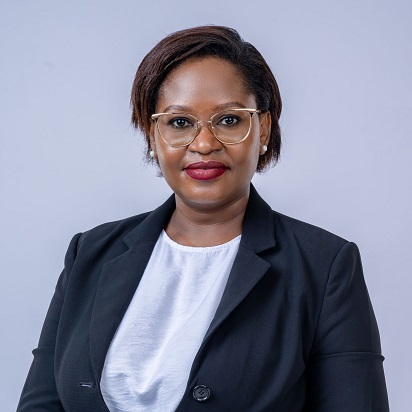
Q&A: Inside dfcu Foundation’s Rebranding & Vision For Uganda’s Entrepreneurs
Mabel Kasente Ndawula (pictured), the Executive Director of dfcu Foundation, recently sat down with Business Focus to discuss the organization’s rebranding from the Agribusiness Development Centre (ADC) to dfcu Foundation, its expanded mission, and the roadmap ahead. In this exclusive interview, she highlights the Foundation’s key focus areas, milestones, and the principles guiding her leadership.
Q: The Agribusiness Development Centre recently rebranded to dfcu Foundation. What prompted this change?
A: The Agribusiness Development Centre (ADC) was established in 2017 with a clear mandate: to support agribusinesses in becoming sustainable and bankable. Over the years, we realized that while agriculture remains critical, Uganda’s entrepreneurial ecosystem requires broader intervention. Many small businesses in the trade and business sector, especially those led by women and youth, face similar challenges—access to finance, markets, and skills, among others. In November 2024, ADC was rebranded to dfcu Foundation to reflect our expanded scope. This aligns with dfcu Bank’s purpose of transforming lives and businesses across Uganda. dfcu Foundation is now positioned to drive inclusive growth by equipping not just agribusinesses, but also Micro, Small and Medium Enterprises (MSMEs) in the trade and business sector with the tools they need to thrive.
Q: What are the key focus areas for dfcu Foundation?
A: We focus on three key areas. Enterprise Development is one of our top priorities. Here, we build the capacity of MSMEs, smallholder farmers, and agribusinesses through training, mentorship, and technical assistance. Skills like financial literacy, governance, and sustainable practices are central. The other area of focus is Expansion of Financial Access. Many entrepreneurs, especially women and youth, struggle to secure affordable credit. We bridge this gap by linking them to financing opportunities, including our Catalytic Fund, which, when activated, will offer subsidized revolving credit to MSMEs participating in our programs. The other aspect of our work is protecting the environment. Sustainability is important to dfcu. Through our Tree Planting Promotion Program (TP3), we plan to plant 500,000 trees in the next five years to build climate resilience in the communities we support.
Q: Who benefits from dfcu Foundation’s programs?
A: Our doors are open to smallholder farmers, women-led businesses, young entrepreneurs, and Micro, Small, and Medium Enterprises—particularly underserved groups. Over the next five years, our goal is to transform the socio-economic status of 100,000 beneficiaries, with 60% being women and 40% youth. In agriculture, we focus on value chains like coffee, livestock and dairy, cereals, and oil seeds. For trade and business, our focus is women in business, youth-led businesses, MSMEs in the oil and gas supply chain, family businesses, youth-led business, as well as SACCOs and Investment Clubs. Even community groups working on climate-resilient projects can partner with us.
Q: What specific support do you offer farmers and agribusinesses?
A: Our hands-on programs provide training, coaching, mentorship and technical assistance. We cover financial literacy, agronomy, market linkages, and post-harvest handling, as well as business management and formalization support. For example, the Financial Expansion for Agricultural Transformation (FEAT) program, in partnership with Rabo Foundation, helps farmers and agribusinesses scale productivity and access finance.
We also run a Business Accelerator Program and collaborate with initiatives like Hi Innovator to nurture high-potential agribusinesses. The key qualification? Commitment to growth and adopting better practices. Just visit the dfcu Foundation offices, or any dfcu Bank branch and we will serve you.
Q: How does the Foundation promote sustainable farming?
A: Climate change is a real threat. We train farmers in agronomy, crop economics and climate-resilient techniques. Our accelerator programs also support innovations that balance profitability and environmental sustainability. Our TP3 program is intentionally designed to promote climate resilience practices and will be embedded in all our initiatives.
Q: What key challenges do farmers face, and how can they be addressed?
A: Limited access to finance, poor record-keeping and climate vulnerability top the list. Others include gender disparities, market access challenges and post-harvest losses. Solutions lie in initiatives like strengthening the capacity of producer organizations, adopting digital tools, and forging partnerships to improve market access and financial inclusion.
Q: How does dfcu Foundation support women in business?
A: Women face unique barriers, and our Business Accelerator Program (BAP) is tailored to support them. We offer mentorship, market linkages, and digital learning platforms like SOMA and Atingi. Through our collaborations with dfcu Bank, we support the Women in Business (WiB) initiatives such as dfcu Bank’s Rising Woman initiative, with enterprise development services. We target women running formal or semi-formal businesses in agribusiness, trade, and services—especially those ready to scale.
Q: In light of the rebranding process, what milestones has the Foundation achieved?
A: Since 2017 prior to rebranding to dfcu Foundation, we have trained thousands of farmers and businesses, but notable achievements include, strengthening 1,000+ agribusinesses, facilitating UGX 100 billion in loans to farmers and MSMEs, supporting 31,000+ women entrepreneurs (56% of beneficiaries). The rebrand marks a new chapter – scaling our reach to 100,000 beneficiaries by 2029.
Q: What principles guide your daily leadership?
A: I believe effective leadership is rooted in collaborative teamwork that sparks innovation. It thrives on placing the right people in the right roles—where skill, attitude, and adaptability intersect. True leadership also demands an accountable approach to work, resilience in the face of challenges, and a commitment to consistently delivering strategic value to all stakeholders.
Q: What’s your call to action for Uganda’s entrepreneurs and your stakeholders?
A: I encourage entrepreneurs to take advantage of dfcu Foundation’s programs. Whether you are a farmer, a woman in business, or a youth with a startup, we are here to help you grow. Together, we can build a more inclusive and sustainable economy.
Source: Business Focus – https://businessfocus.co.ug/qa-inside-dfcu-foundations-rebranding-vision-for-ugandas-entrepreneurs/
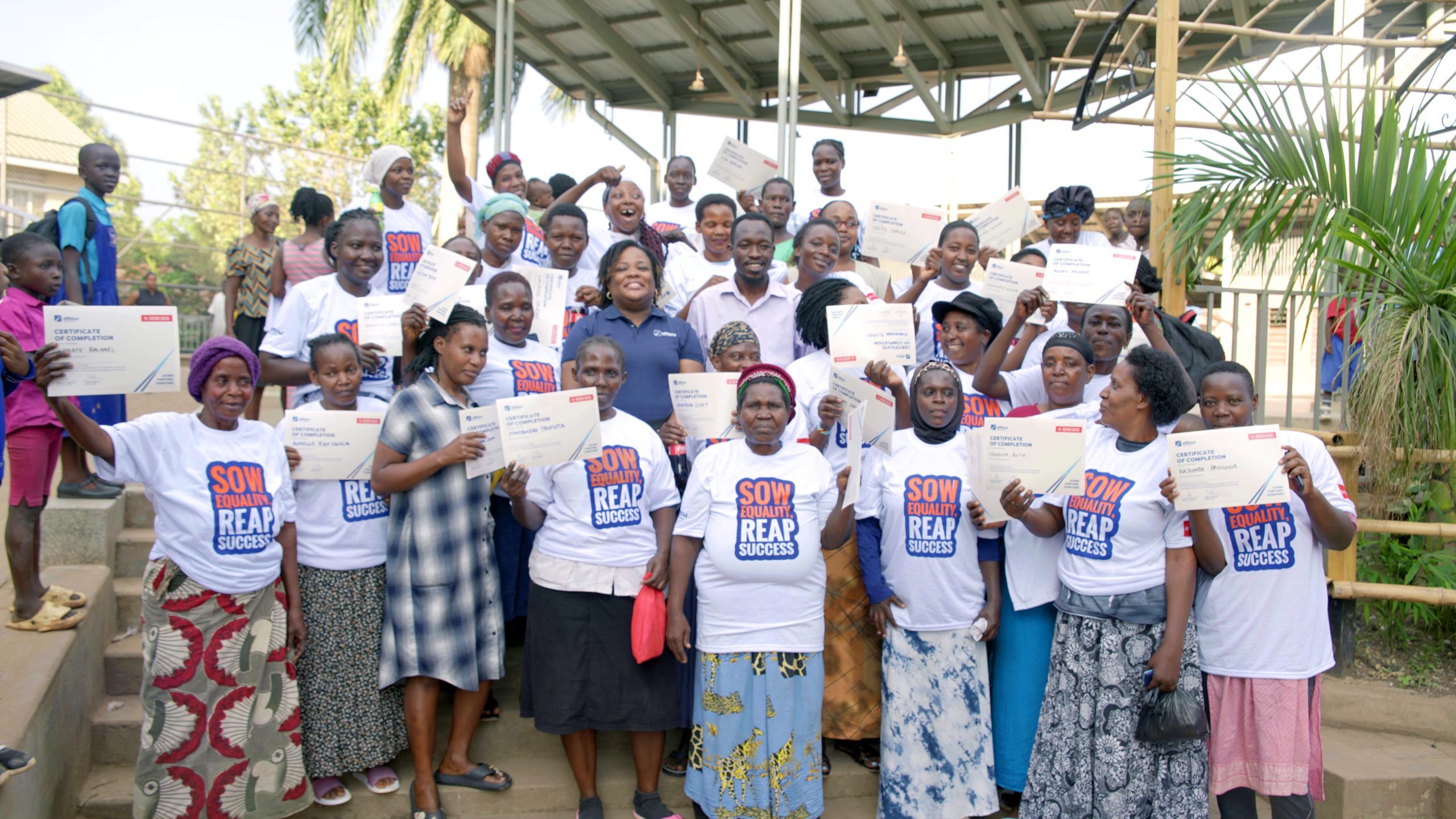
Empowering Women Entrepreneurs in Kamwokya: Financial Literacy that Transforms Lives!
KAMPALA – On April 3, 2025, the dfcu Foundation, in collaboration with the Investment Fund for Developing Countries (IFU), hosted a one-day Gender Bootcamp at the TLC in Kamwokya. The training event was designed to directly address key challenges faced by many women-led micro-enterprises, including limited access to financial services, poor record-keeping, and low financial literacy.
The bootcamp, facilitated by dfcu Foundation Business Advisor Sharon Nambasa, was a resounding success, attracting a full house of 100 participants. Of those in attendance, 80% were women entrepreneurs eager to enhance their business skills.
Participants were equipped with essential knowledge in budgeting, understanding various financial products, and practicing inclusive leadership. The training also provided a valuable opportunity to introduce attendees to relevant dfcu Bank financial solutions, reinforcing the bank’s commitment to supporting the growth of Uganda’s Micro and Small Enterprises.
By providing these vital skills and connections, the dfcu Foundation and its partners continue to play a crucial role in empowering women entrepreneurs and strengthening the local business community.
#dfcuFoundation #GenderInclusion #FinancialLiteracy #WomenInBusiness #IFUImpact @dfcugroup
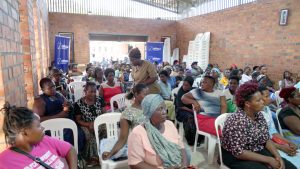
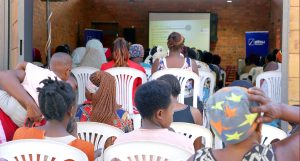

ADC ED Recognised in the CEO East Africa Magazine 2024
We are proud to announce that our Executive Director, Josephine Mukumbya, has been recognized in the CEO East Africa Magazine as one of Uganda’s 100 Leading and Most Admired CEOs 2024
Her visionary leadership at the Agribusiness Development Centre (ADC) continues to inspire and drive impactful change in the agribusiness sector. This recognition is a testament to her dedication, passion, and relentless commitment to empowering communities and fostering sustainable development.
Read more about the recognition in CEO East Africa Magazine here: https://www.ceo.co.ug/ugandas-100-leading-and-most-admired-ceos-2024/
Join us in congratulating Josephine on this remarkable achievement!
#Leadership #Recognition #AgribusinessExcellence #Inspiration #UgandasTop100CEOs #JosephineNakoma #ADC

A monitoring visit to Buikwe
Dive into the inspiring journey of the Reach Out Cooperative and SAO SACCO as we showcase the transformative impact of ADC’s in Buikwe District. From training programs to financial literacy initiatives supported by partners like dfcu Bank and JICA, witness how these cooperatives and SACCOs are driving financial empowerment, fostering sustainability, and unlocking opportunities for growth. Join us in exploring the stories of resilience, hope, and success as ADC continues to shape lives and communities across Uganda. Don’t forget to like, share, and subscribe to stay updated on our latest impact stories!

Hi Innovator Impact Story
Shaping the Future of Uganda’s Young Entrepreneurs! Towards the end of last year and earlier this year, we embarked on an exciting activation to introduce the Hi-Innovator Program to students in various institutions across the country. This initiative, led by NSSF and the MasterCard Foundation, and implemented by *Outbox, has provided students with invaluable opportunities to choose between the Business Foundation Course and the Career Planning Course – both designed to equip them with practical skills for their entrepreneurial and professional journeys.
Students who enrolled in the Business Foundation Course gained vital knowledge in business management, learned how to prepare profit and loss statements, set both short- and long-term goals, and discovered the importance of branding, promotion, and sales strategies for business growth.
Meanwhile, those who took the Career Planning Course benefited from enhanced career guidance, understanding how to align their passions with career goals, personal branding, and job market navigation. This course has been crucial in helping students strategically plan for their futures, whether as entrepreneurs or professionals. The Hi-Innovator Academy offers even more courses like E – Business essentials, Business Compliance among others to support young innovators in building successful ventures and thriving careers.
A huge thank you to Outbox for expertly implementing the program, and to NSSF and the MasterCard Foundation for creating such a transformative initiative. The impact on Uganda’s youth has been profound, providing them with the skills and confidence to forge ahead in their entrepreneurial and career pursuits. Together, we are building the next generation of business and industry leaders.




